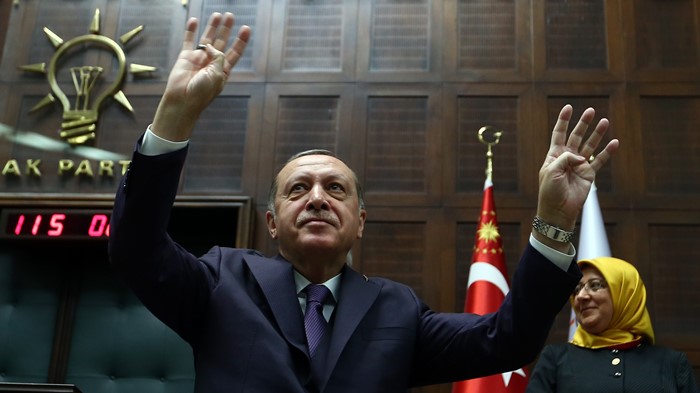Turkish President Recep Tayyip Erdoğan on Tuesday said the case against Reza Zarrab, a Turkish-Iranian gold trader who has been charged in Manhattan with conspiring to violate US sanctions on Iran, is a conspiracy against Turkey.
“One of the biggest traps of history was organized under the mask of law on Dec. 17-25 [2013]. They take the conspiracy and put it into practice in the US after they failed due to the tough stance and foresight of our nation,” said Erdoğan in his speech at his ruling Justice and Development Party (AKP) group meeting in Parliament.
Erdoğan also criticized the opposition for their position on the Zarrab case in the US and for calling a July 15, 2016 failed coup attempt “theater” and a “controlled coup.”
Erdoğan blames the Gülen movement and the outlawed Kurdistan Workers’ Party for all the international problems besetting Turkey.
Warning “international circles” about their plans targeting Turkey politically and economically Erdoğan said: “Turkey is not a country that you can play with like a toy.”
“As much as our friendship is voluntary, so much so is our enmity severe.”
Zarrab was the prime suspect in a major corruption investigation in Turkey that became public in December 2013 in which with others from the inner circle of the ruling AKP government and then-Prime Minister Erdoğan for having paid Cabinet-level officials and bank officers bribes to facilitate transactions benefiting Iran.
After Erdoğan cast the case as a coup attempt to overthrow his government orchestrated by his political enemies, several prosecutors were removed from the case, police were reassigned and the investigation into Zarrab was dropped.
Zarrab and Turkey’s Halkbank Deputy General Manager Mehmet Hakan Atilla were arrested in the US for conspiring to violate US sanctions on Iran. The US District Court for the Southern District of New York on Sept. 6 also indicted former Turkish Economy Minister Mehmet Zafer Çağlayan, former Halkbank General Manager Süleyman Aslan, Levent Bakkal and Abdullah Happani and ordered arrest warrants for them.
News published in the US media that Zarrab, arrested in Miami in March 2016, could have pled guilty rang alarm bells in Ankara.
The Turkish government issued a diplomatic note last week urging the US to notify Turkish authorities before relocating Zarrab to another facility.
According to the state-run Anadolu news agency, Foreign Minister Mevlüt Çavuşoğlu said Turkey sent two notices to US authorities after Zarrab’s lawyers were unable to reach him.
President Erdoğan on Oct. 24 strongly criticized the US administration for allegedly trying to force Zarrab to give them names from the Turkish government, saying he would explain all the details.
“They are driving him [Zarrab] into a corner, trying to make him an informer by saying, ‘If you mention those names, it [your prison term] will be this long, if you mention those names it will be that long’,” Erdoğan said, adding: “We are following this. We know how to set the world on fire when all those issues are done. We will tell all.”
Erdoğan demanded the release of Zarrab as well as the firing of then-US Attorney Bharara during a private meeting with then-US Vice President Joe Biden on Sept. 21, 2016, devoting half the 90-minute conversation to Zarrab, David Ignatius wrote for The Washington Post on Oct. 12.
“Erdogan’s campaign to free Zarrab has been extraordinary. He demanded his release as well as the firing of Bharara in a private meeting with then-Vice President Joe Biden on Sept. 21, 2016, in which U.S. officials say half the 90-minute conversation was devoted to Zarrab,” Ignatius wrote.
“Erdogan’s wife [Emine Erdoğan] pleaded the case that night to Jill Biden [wife of Biden]. Turkey’s then-justice minister, Bekir Bozdag, visited then-Attorney General Loretta E. Lynch in October to argue that the case was ‘based on no evidence’ and that Zarrab should be released.”
According to former aides, “Erdoğan appealed personally about the matter in his last two phone calls with President Barack Obama, in December and early January.
“Our operating assumption was that Erdoğan’s obsession with the case was that if it moved forward, information would come out that would damage his family, and ultimately him,” said one former senior Obama official, Ignatius noted.



